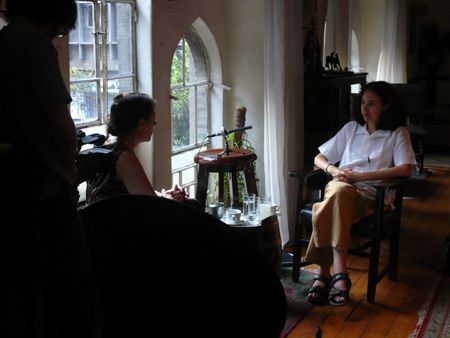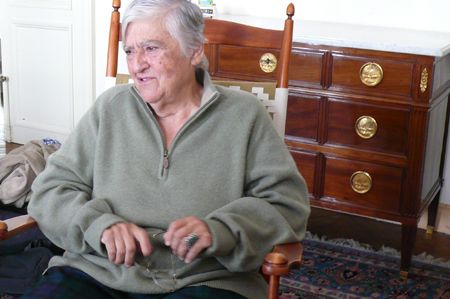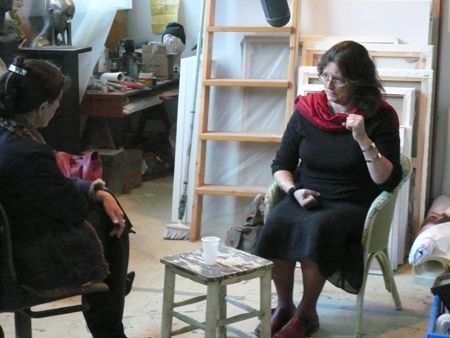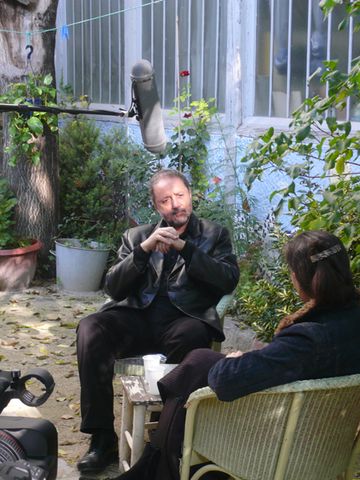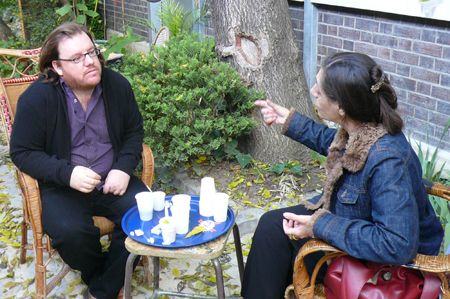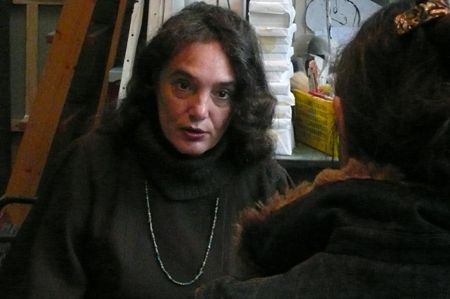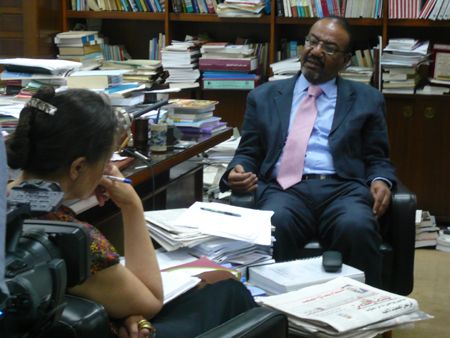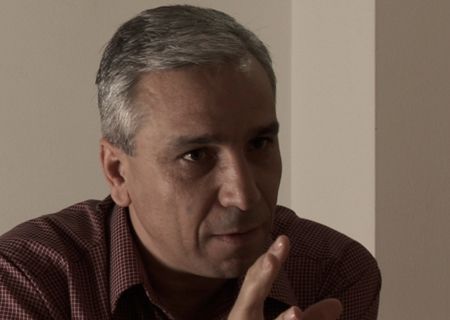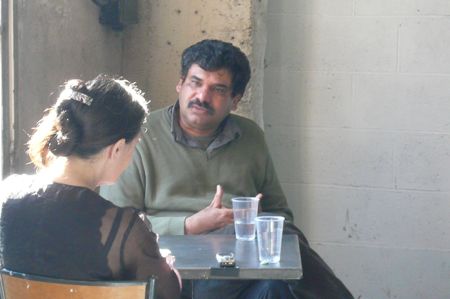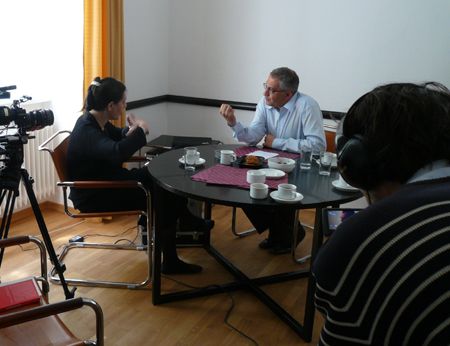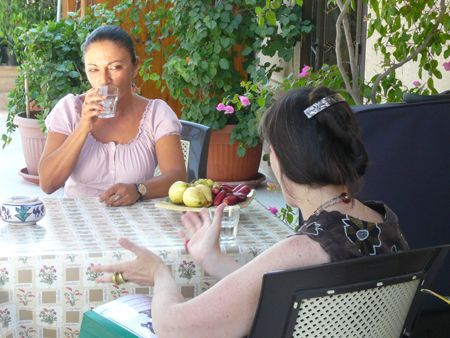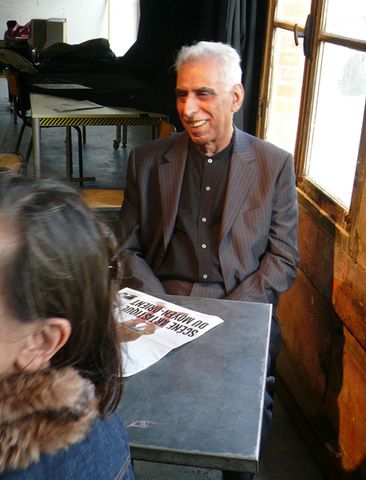Filmed conversations
Sat, Dec 8, 2007–Sun, Jan 13, 2008
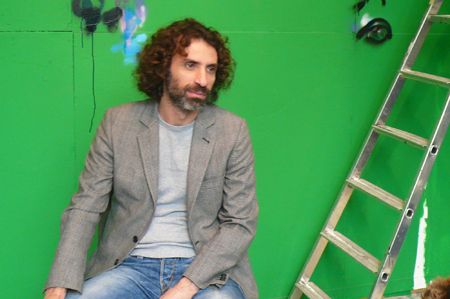
Three generations of artists, intellectuals and, at the same time, political actors from the Middle East will have an opportunity to speak. All too often, the focus on war and violence leads us to lose sight of their cultural achievements and social commitment. However, these creative artists oppose the stifling academicism of their home countries and the mystical transfiguration of tradition with unsparing diagnoses of the present and precise forms of presentation. In their talks with Catherine David, they discuss the present in the region in full awareness of the critical situation there. Each day, viewers can see filmed discussions as large projections on all floor-levels of the House of World Cultures.
Mona Abaza
"Changing Consumer Cultures of Modern Egypt. Cairo’s urban reshaping"
Mona Abaza. The sociologist, who was born in Egypt in 1959, does research on religious networks between the Middle East and Southeast Asia and on changes in consumer society. She teaches at the American University in Cairo. Her latest publication is Changing Consumer Cultures of Modern Egypt (2006). Her most recent publication is: „Changing Consumer Cultures of Modern Egypt“ (2006). Her publications also include "Debates on Islam and Knowledge in Malaysia and Egypt: Shifting Worlds", RoutledgeCurzon 2002.
Etel Adnan
"In the Heart of the Heart of Another Country" - The Life and Work of a Poet
Etel Adnan was born in Beirut in 1925. She is a very versatile artist and writer. In her native town, she studied comparative literature. Later, she studied philosophy at the Sorbonne, Harvard and Berkeley. She writes lyric poetry, prose and plays in English and French, and also paints. Her books have been translated into Arabic, Italian and German; her poems have been set to music by notable musicians. In 1985 she worked with Robert Wilson on his opera CivilwarS. She lives in Paris and Beirut. selected books: Marie Rose. Paris: Des Femmes 1978, L'apocalypse arabe. Paris: Papyrus Editions 1980, Ce ciel qui n'est pas. Paris: L'Harmattan 1997.
Hala al Abdallah
Cultural Resistance. Documentary cinema and contemporary Syria
Hala Alabdalla was born in Hama, Syria in 1956. A sociologist who studied in Syria and Paris, she has been working as a film-maker since 1985. She has made feature and documentary films as a producer, author and director in Syria, the Lebanon and France.
Omar Amiralay
Documentary, history and memory
Omar Amiralay is famous well outside the borders of Syria as a critical documentary film-maker as well as for his commitment to civil society. He played a prominent role in the Damascus Spring, an incipient movement for democracy that was suppressed in 2001. As director and manager of a film academy in Damascus, he is concerned, above all, with handing down the historical experiences of his society. His recent films include: „Par un jour de violence ordinaire, mon Ami Michel Seurat ...“ (1996), „Il y a tant de Choses encore à raconter“ (1997), „A Plate of Sardines (or the First Time I Heard of Israel)“ (1997), L'homme aux semelles d'or (2000), „A Flood in Baath Country“ (2003).
Sinan Antoon
Iraq: Di/Visions of War
Safaah Fahty
Symbolic and Political power in contemporary Egypt
Safaa Fathy was born in Egypt in 1958. She studied theatre at the Sorbonne and gained her doctorate with a thesis on Bertolt Brecht. In 1994 she started working on her first films. Her co-operation with the philosopher Jacques Derrida for the filmed biography D’ailleurs Derrida attracted considerable attention. Derrida and Fathy reflect on their experiences with the film in their joint book Tourner les mots. Au bord d’un film. She has also made a name for herself as a poet and theoretician.
Nabil Abdel Fattah
Egypt after Mubarak
Nabil Abdel Fattah is a political scientist. He works at the Al Ahram Center for Political and Strategic Studies, an important think-thank in Cairo. His main areas of research include political Islam and educational policy.
Yassin al Haj Saleh
An analysis of contemporary Syria
Yassin al Haj Saleh was born in Syria in 1961. He is one of the most important dissidents in Syria. In 1980, while he was studying medicine in Aleppo, he was arrested for belonging to the Communist Party and spent sixteen years in prison, the last of these in the much-feared Tadmur Prison. In 1996, he was released. In 2000, he took his final examination as a general medical practitioner. He has never practised his profession, however. He lives in Damascus and writes for Arabic print media on political, social and cultural subjects from Syria and the Arab world.
Kadhim Jihad Hassan
"La part de l’étranger" - Modern arab poetry and thinking
Kadhim Jihad Hassan enjoys a good reputation as a poet, translator and teacher in the Arab world and in France. His oeuvre serves as a bridge between the two. He was born in Iraq in 1955 and has been living in Paris since 1976, where he teaches at both the Sorbonne and the Institut National des Langues et Civilisations Orientales. He has translated into Arabic not only Arthur Rimbaud, Rainer Maria Rilke and Dante’s The Divine Comedy, but also Gilles Deleuze, Jacques Derrida, Jean Genet, Juan Goytisolo and Philippe Jaccottet. He is the author of „Chants de la folie de l'Etre et autres poèmes“ (Tarabuste, 2001), „Le Roman arabe (1834-2004): bilan critique“ (Sindbad/Actes Sud, 2006), „Le Livre des prodiges, anthiologie des Karâmât des saints de l'islam“ (Sindbad/'Actes Sud, 2003), „La Part de l'étranger_La traduction de la poésie dans la culture arabe“ (Sindbad/'Actes Sud, 2007), among other publications.
Amnon Raz- Krakotzkin
"Binationalism and the critique of zionism"
Amnon Raz-Krakotzkin, Professor of Jewish Studies at Ben-Gurion University, is one of the most prominent advocates of binationalism as a solution to the Israeli-Palestinian conflict. His main subjects are Christian-Judaic discourse of the early modern age and the history of Zionism ideas. His publications include: Exile et Binationalisme (Paris); Orientalism, Jewish Studies and Israeli Society (in Hebrew). He is a fellow, for the second time, of the Wissenschaftskolleg zu Berlin. Author of „The Censor, the Editor, and the Text: The Catholic Church and the Shaping of the Jewish Canon in the Sixteenth Century“ (University of Pennsylvania Press, 2007).
Samia Mehrez
"Egypt’s culture wars: Politics and Practice"
Samia Mehrez, Professor of Modern Arabic Literature at the American University in Cairo, has made cultural-political struggles in 21st century Egypt the focal point of her recent research. In her research, she employs the analytical approaches of cultural studies, translation theory and gender studies. Her latest publication: Egypt’s Culture Wars: Politics and Practice (Routledge, 2008) will be appearing soon. Read here an excerpt...
Rabih Mroué
"Who Is Afraid of Representation?" - Making Theatre in Beirut
Saadi Youssef
On Poetry and Occupied Iraq
Saadi Youssef, was born in Basra, Iraq, in 1934. He is one of the most highly regarded Iraqi poets. Because of his political commitment, he was forced to leave the country when Saddam Hussein came to power. During his life in exile, he has stayed at many different places. He now lives in London. He has translated Walt Whitman, Constantine Cavafy, Federico García Lorca and George Orwell, among others, into Arabic. His publications inlcude „Troubled Waters“ (poems, Al Mada, Beirut 1995), „Without an Alphabet, Without a Face“ (Minnesota 2002) and „Fern vom ersten Himmel“ (Verlag Hans Schiler, Berlin 2004).
